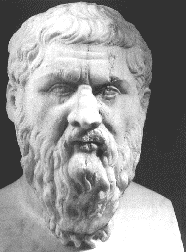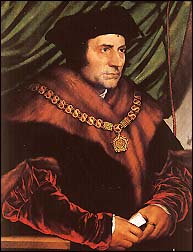This page is being built as we move through the course and will change, adding new materials that we find in our search for the truth about human dreams of perfection. Please check it regularly and feel free to make suggestions about ways to improve it. Send them to me at tbacig@d.umn.edu.
 Next we turn to the writings of one of the greatest minds in the history
of Western Culture, the Greek philosopher Plato. Specifically, we
examine portins of his account of a "perfect" society,
The Republic. The Republic is one of the "great books"
of the western tradition and classical culture. Reading Benjamin Jowett's
introduction to his translation of The Republic is an excellent way
to start your reading of the assigned portions of this great work.
Understanding its background and
setting will also assist you in making sense of the selections you will read from
Books V
and VI.
Next we turn to the writings of one of the greatest minds in the history
of Western Culture, the Greek philosopher Plato. Specifically, we
examine portins of his account of a "perfect" society,
The Republic. The Republic is one of the "great books"
of the western tradition and classical culture. Reading Benjamin Jowett's
introduction to his translation of The Republic is an excellent way
to start your reading of the assigned portions of this great work.
Understanding its background and
setting will also assist you in making sense of the selections you will read from
Books V
and VI.
 The emergence of Christianity from Judaic traditions produced a new kind
of utopian thought. In the writings of Isaiah,
we encounter the Hebraic version that is the basis for Saint
Matthew's account or Jesus of Nazareth's version of His Father's
kingdom, which "is not of this world." St Augustine's
late Roman Christianity produces his City
of God yet another response to the question of what constitutes the
ideal society and, in the process, establishes the other worldy utopian
thinking that characterizes the Medieval period.
The emergence of Christianity from Judaic traditions produced a new kind
of utopian thought. In the writings of Isaiah,
we encounter the Hebraic version that is the basis for Saint
Matthew's account or Jesus of Nazareth's version of His Father's
kingdom, which "is not of this world." St Augustine's
late Roman Christianity produces his City
of God yet another response to the question of what constitutes the
ideal society and, in the process, establishes the other worldy utopian
thinking that characterizes the Medieval period.
 Thomas More, a
Renaissance humanist, wrote Utopia,
the work from which this course and the literary genre of utopian and
dystopian writing draw their names. His notion of the Christian
commonwealth provides a new basis for imagining the perfect society and
raises issues about the tension between individual freedom and social
order. More's work is the product of a new vision of the perfectability of
human nature emerging from the Renaissance. The story of his struggle
with Henry the VIII which we will see in A Man for
All Seasons, portrays his heroism, and sheds considerable light on
his sense of the relationship between the individual and his society; the
film will also help us to understand the context from which his dream of a
perfect society rises.
The views and opinions expressed in this page are strictly
those of the page author. The contents of this page have not been reviewed
or approved by the University of Minnesota.
This web page (http://www.d.umn.edu/cla/faculty/tbacig/utopia/) is
maintained by Tom Bacig, and was last updated Thursday, 27-Sep-2012 15:24:07 CDT Send comments to
tbacig@d.umn.edu.
Thomas More, a
Renaissance humanist, wrote Utopia,
the work from which this course and the literary genre of utopian and
dystopian writing draw their names. His notion of the Christian
commonwealth provides a new basis for imagining the perfect society and
raises issues about the tension between individual freedom and social
order. More's work is the product of a new vision of the perfectability of
human nature emerging from the Renaissance. The story of his struggle
with Henry the VIII which we will see in A Man for
All Seasons, portrays his heroism, and sheds considerable light on
his sense of the relationship between the individual and his society; the
film will also help us to understand the context from which his dream of a
perfect society rises.
The views and opinions expressed in this page are strictly
those of the page author. The contents of this page have not been reviewed
or approved by the University of Minnesota.
This web page (http://www.d.umn.edu/cla/faculty/tbacig/utopia/) is
maintained by Tom Bacig, and was last updated Thursday, 27-Sep-2012 15:24:07 CDT Send comments to
tbacig@d.umn.edu.

![[Free Speech Online]](ribbar.gif)
The University of Minnesota is an equal opportunity educator and
employer.